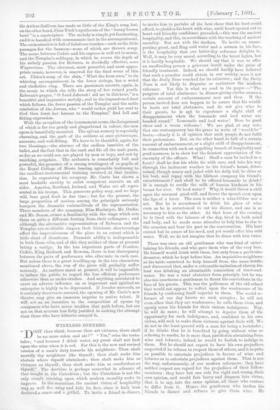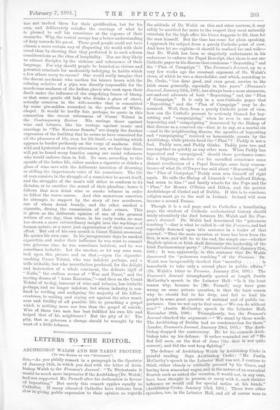WINELESS DINNERS.
"DOST thou think, because thou art virtuous, there shall be -no more cakes and ale ?" Yes," cries the teeto- taler ; "and because I drink water, my guest shall not look upon the wine when it is red. For this is the new and revised version of a man's duty towards his neighbour: Thou shalt mortify thy neighbour like thyself ; thou shalt make him abstain where thyself abstainest ; thou shalt make him as virtuous as thyself ; thou shalt make him as comfortless as thyself." The doctrine is perhaps somewhat in advance of that taught in the Catechism ; but the Catechism is not the only simple teaching upon which modern morality seeks to improve. In the meantime, the ancient virtue of hospitality may as well flee away and hide its -face, since it hath been declared,a snare and a pitfall. To invite a friend to dinner, to invite him to partake of the best cheer that his host could afford, to gladden his heart with wine, until heart opened out to heart and friendly confidence prevailed,—this was the ancient hospitality, and this, in accordance with the teaching of ancient morality. But not with the modern. To invite an unsus- pecting guest, and fling cold water and a sermon in his face,. is the hospitality that our latter-day reformer delights iv. Well, it may be very moral, according to the latest lights, but it is hardly hospitable. We should say that it was to offer an unoffending person a grievous insult under the guise of friendly treatment. Indeed, we should hardly have believed that such a.practice could obtain in our society, were it not that the Daily News vouched for its existence ; and the Daily. News is not likely to dispraise or caricature the modern reformer. Yet this is what we read in its pages :—" The• progress of total abstinence in dinner-giving circles causes a certain amount of embarrassment now and then. If the person invited does not happen to be aware that his would-- be hosts are total abstainers, and do not give wine to- their guests, he is apt to experience a slight chill of" disappointment when the lemonade and iced water are. handed round." Lemonade and iced water ! Here be good cheer and a warm welcome ! We are glad, at any rate,. that our contemporary has the grace to write of "would-be "' hosts,—clearly it is of opinion that such people do not fulfil their pretensions. But, on the other hand, to talk of a certain amount of embarrassment, or a slight chill of disappointment,. in connection with such .an appalling breach of hospitality and good manners, is to show but the faintest appreciation of the- enormity of the offence. What ! Shall a man be invited to a feast P shall he don his white tie with care, and take his way through the inclement weather to his friend's house`, deter- mined, though weary and jaded with his daily toil,"to shine at his best, and repay with the blithest company his friend's entertainment P and shall he be offered lemonade to drink P. It is enough to curdle the milk of human kindness in his. breast for ever, Or iced water P Why, it would throw a chill upon the warmest good-will, and freeze the speech even upon the lips of a lover. The man is neither a wine-bibber nor a sot. But he is accustomed to drink his glass of wine even as he is accustomed to eat his dinner, and one is as. necessary to him as the other. At that hour of the evening: he is tired with the labours of the day, tired in both mind and body, and he needs some stimulus to help' him to rise to the occasion and bear his part in the conversation. His host cannot but be aware of his need, and yet would offer him cold water, Well, we do not imagine that he dines with him twice.
There was once an old gentleman who was fond of enter- taining his friends, and who gave them wine of the very best. He himself would drink with them, but only from a particular decanter, which he kept before him. An inquisitive neighbour at his table contrived to help himself from the same bottle,. and discovered that, under a colourable imitation-of sherry, his host was drinking an abominable concoction of toast-and.. water. He was a total abstainer from principle, but he was also too courteous a gentleman to flaunt his convictions in the face of his guests. This was the politeness of the old school that would not appear to reflect upon the weaknesses of its friends by confessing itself superior to them. The social re- former of our day knows no such scruples ; he will not even allow that they are weaknesses ; he calls them vices, and openly rates his friends for their vicious indulgence. Nay,.. he will do more ; he will attempt to deprive them of the opportunity for such indulgence, and, confident in his own virtue, will seek to make them virtuous against their will, We do not in the least quarrel with a mail for being a teetotaler.;. if he thinks that he is benefited by going without wine or • refusing to smoke, he is more than justified in abstaining from wine and tobacco; indeed, be would be foolish to indulge in them. But he should not expect to have his own prejudices. respected if he refuses to respect those of others, and it is quite as possible to entertain prejudices in favour of wine and tobacco as to entertain prejudices against them. That is not the way, unfortunately, of our modern reformers : they have neither respect nor regard for the prejudices of their fellow-- creatures : they have but one rule for right and wrong, their. own opinion, and would fain harry and dragoon into virtue, that is to say, into the same opinion, all those who venture to differ from it, Hence the gentleman who invites his friends to dinner and refuses to give them wine. He
has not invited them for their gratification, but for his own, and deliberately satisfies the cravings of what he is pleased to call his conscience at the expense of their stomachs. Why, the veriest savage has a better understanding of duty towards his guest. These good people could not have chosen a more certain way of disgusting the world with their creed than by showing that they preferred it to such solemn considerations as the rites of hospitality. Nor are they likely to attract disciples by the violence and vehemence of their language. For why should people be branded as vicious and potential criminals for moderately indulging in habits which a few others carry to excess? One would really imagine that the decent mechanic who soothes his leisure hours with the calming sedative of a pipe, was directly responsible for the murderous madness of the Indian ghazis who rush upon their death under the influence of the stupefying fumes of bhang, or that some gentle old lady who drinks a glass of claret, actually connives in the wife-murder that is committed by some gin-sodden scoundrel in the purlieus of White- • chapel. It would be hardly fair, perhaps, to quote in this connection the recent utterances of Count Tolstoi in the Contemporary Review. His ravings there against wino and tobacco, like his ravings against music and marriage in "The Kreutzer Sonata," are simply the further .expression of the loathing that he seems to have conceived for all the pleasures of life, even for life itself,—a loathing which .appears to border perilously on the verge of madness. Still, wild and hysterical as those utterances are, we fear that there will yet be found many fanatics among our social reformers who would endorse them in full. No man, according to this .apOstle of the better life, either smokes a cigarette or drinks a glass of wine save with the deliberate intention of drowning or stifling the importunate voice of his conscience. The life -of man consists in the struggle of a conscience to assert itself, • and the struggles of the man's will either to conform to its dictates, or to smother the sound of their pleading : hence it follows that men drink wine or smoke tobacco in order to follow the worse course. And this monstrous assertion he attempts to support by the story of two murderers, one of whom drank brandy, and the other smoked a cigarette, during the commission of their crimes. This is given as the deliberate opinion of one of the greatest writers of our day, than whom, in his early works, no man has shown a more extraordinary insight into the workings of ,human nature, or a more just appreciation of their cause and effect. But out of his own mouth is Count Tolstoi answered. He quotes his own• case. In his unregenerate days he smoked -cigarettes, and under their influence he was wont to commit two grievous sins : he was sometimes indolent, and he was sometimes irritable. Let the smoker, or let any sane man, look upon this picture and on that ;—upon the cigarette- .smoking Count Tolstoi, who was indolent perhaps, and a trifle irritable, but who nevertheless produced, for the delight and instruction of a whole continent, the delicate idyll of Katia," the endless scenes of " War and Peace," and the moving drama of "Anna Karenina ;"—and then on the Count Tolstoi of to-day, innocent of wine and tobacco, less irritable perhaps, and no longer indolent, but whose industry is con- fined to reviling and maligning the majority of his fellow- creatures, to wailing and crying out against the utter weari- ness and futility of all possible life, to preaching a gospel which is nothing more nor less than the gospel of suicide. Who of those two men has best fulfilled his own life and helped that of his neighbours ? Bat. the pity of it ! The pity, that so grievous a change should be wrought by the want of a little tobacco.











































 Previous page
Previous page